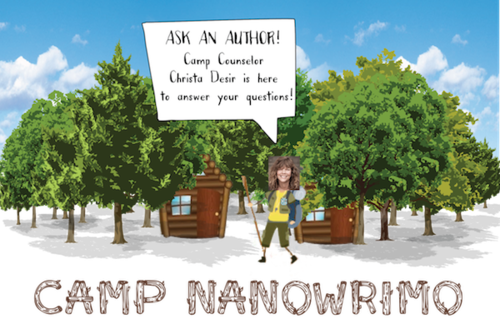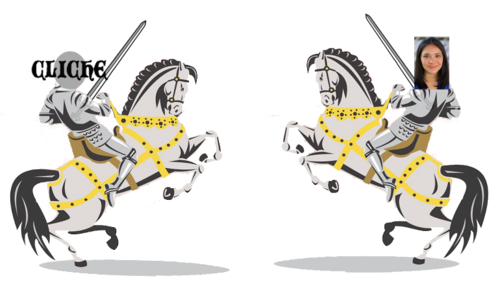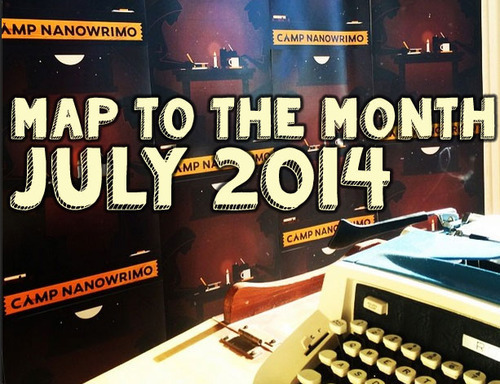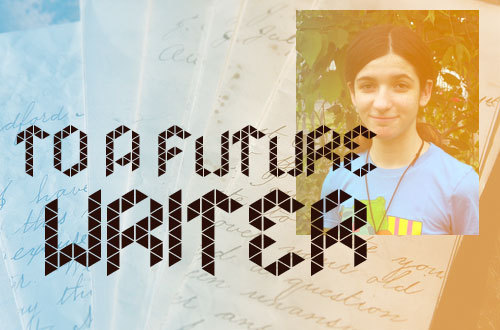Chris Baty's Blog, page 186
July 7, 2014
Ask An Author: "How do you write good issue scenes without making them exploitative?"

Each week, a new author will serve as your Camp Counselor, answering your writing questions. Christa Desir, our first counselor, writes contemporary fiction for young adults, and has volunteered as a rape victim activist for more than ten years. Her second book , Bleed Like Me , will be out this fall.
How do you write good issue scenes without making them exploitative? — Anonymous
So for me, the foundation of my issue books has always been testimony. I listen to people’s stories. I think any good writer is a good listener and a collector of stories. When it comes to tackling difficult issues so that they aren’t cliché or “after school special,” I start by reading or talking to people who have been through those issues. Then I think about what I want to say about these things. Not in terms of a “message,” but more in terms of what questions do I want to ask readers to think about.
I don’t believe fiction should be prescriptive. I don’t think it should be an alternative to therapy. And while I do know many people who have said certain books have “helped,” I think it is because those books asked the reader a question about themselves that made the reader understand something. It wasn’t the book that fed the answer to the reader, it was the question that sparked something.
Discussion of sexual assault under the cut.
The other thing I think about when taking on difficult issues is what else has been said. For example, in the case of my book Fault Line, which deals with sexual assault, I did not want to write another Speak, the amazing book by Laurie Halse Anderson. I think Speak is a beautiful book that tackles rape in a very important and thoughtful way.
I wanted to look at the people beyond the survivor who were impacted by sexual violence. In particular, the boyfriend of the survivor who wasn’t at the party when she was gang raped. I wanted to ask a question about what it’s like for those who are involved with survivors. And as far as I could tell, this hadn’t been tackled in this way in the YA canon. I wanted to start a conversation and have readers look at issues of culpability, responsibility, and our knee-jerk reaction of wanting to save/fix someone. I think clichés can be avoided if you start with a really good question and dig as deep into that as you can.
Next week’s Camp Counselor is Liz Coley, author of Young Adult psychological thriller Pretty Girl-13. Ask her your questions here!
July 4, 2014
Ask An Author: How do you avoid writing a Mary Sue character?

Each week, a new author will serve as your Camp Counselor, answering your writing questions. Christa Desir, our first counselor, writes contemporary fiction for young adults, and has volunteered as a rape victim activist for more than ten years. Her second book , Bleed Like Me , will be out this fall.
How do you avoid writing a Mary Sue character? — ShatterStar
Well, this is very easy for me because I’m deeply flawed. And everyone I know is deeply flawed. I am attracted to people who mess up over and over again. (This also is a character flaw of mine). And I have no interest in writing likable characters; I am interested in writing real characters.
The kind of books I write, the kind of books I’m drawn to have deeply broken characters. My jumping-off point is always looking at what the emotional landscape of a character is, seeing what’s wrong with them, wondering what is the worst thing they’ve ever done, wondering what is the thing they would never tell anyone. When you ask these questions, you cannot end up with Mary Sue characters. Even if you don’t include these things in your book, they are questions that are valuable to ask.
The other thing that helps is to build a life for every person in your book. Even the janitor who just comes by to yell at the main character for sneaking back into school after hours. What’s this janitor’s home life like? What’s it like for him to have to sweep up after kids? Is he taking care of someone at home? What is the most recent thing that pissed him off? This is how we build stories for people; this is how we make them real.
Next week’s Camp Counselor is Liz Coley, author of YA psychological thriller Pretty Girl-13. Ask her your questions here!
Ask An Author: "How do you avoid writing a Mary Sue character?"

Each week, a new author will serve as your Camp Counselor, answering your writing questions. Christa Desir, our first counselor, writes contemporary fiction for young adults, and has volunteered as a rape victim activist for more than ten years. Her second book , Bleed Like Me , will be out this fall.
How do you avoid writing a Mary Sue character? — ShatterStar
Well, this is very easy for me because I’m deeply flawed. And everyone I know is deeply flawed. I am attracted to people who mess up over and over again. (This also is a character flaw of mine). And I have no interest in writing likable characters; I am interested in writing real characters.
The kind of books I write, the kind of books I’m drawn to have deeply broken characters. My jumping-off point is always looking at what the emotional landscape of a character is, seeing what’s wrong with them, wondering what is the worst thing they’ve ever done, wondering what is the thing they would never tell anyone. When you ask these questions, you cannot end up with Mary Sue characters. Even if you don’t include these things in your book, they are questions that are valuable to ask.
The other thing that helps is to build a life for every person in your book. Even the janitor who just comes by to yell at the main character for sneaking back into school after hours. What’s this janitor’s home life like? What’s it like for him to have to sweep up after kids? Is he taking care of someone at home? What is the most recent thing that pissed him off? This is how we build stories for people; this is how we make them real.
Next week’s Camp Counselor is Liz Coley, author of YA psychological thriller Pretty Girl-13. Ask her your questions here!
July 3, 2014
Battling Clichés & Tired Tropes: 5 Ways to Let Out a Breath

It’s an age-old writers’ question: What do I do about clichés and well-worn tropes? This month, we’ve asked authors about the clichés and tropes they find themselves falling back on, and how they fix, invert, or embrace them. Today, Kelly Loy Gilbert, author of the forthcoming Conviction, offers five ways to rewrite a cliché:
CLICHÉ: Letting Out A Breath
Clichés in stories are fantastic placeholders as you’re writing—they serve as emotional shorthand—but, if overused, they can stunt your characters’ growth and development. Consider the following mini-scene:
He lifts his wand, and the floors curl away from the walls and towards me. He watches me.
“Are you afraid?” he says.
I can’t breathe. “No.”
“I can’t breathe” works double-time here: it’s a pause, a place for the reader to hold still a moment waiting in suspense for the answer, and it also gives us an emotional undercurrent that runs through the whole scene. As readers we recognize “I can’t breathe” to mean the narrator is afraid, and so we read the scene infused with the narrator’s fear.
Clichés are economical that way. But it’s in these small moments that we have the opportunity to bring our characters to life and make them specific and individual and unique, and there are richer, stronger ways to both provide that basic emotional information and also allow the reader a deeper glimpse into your characters’ hearts and thoughts.
Here are five other tools to set the emotion of a scene:
Filter the scene through your character’s emotional state. What does she notice? What ordinary (or extraordinary) sights and sensations around her take on a different meaning for her because of her emotional state?
He lifts his wand. The floors curl away from the walls and towards me, pressing in threateningly like they mean to suffocate me. He watches me.
“Are you afraid?” he says.
“No.”
Flash back to a memory. What was the first time she felt whatever it is she’s feeling now? What was the most striking time? What is she remembering?
He lifts his wand, and the floors curl away from the walls and towards me. He watches me.
“Are you afraid?” he says, and I feel again that fear when my brother would hold me underwater so long I was certain I was drowning and would come up gasping and clawing at the air.
“No.”
Make a generalization that reveals something of your character’s ideas or beliefs. What does she believe in? How does her worldview align with, or clash with, her feelings now? Can you tease out her feelings by having her make generalized statements?
He lifts his wand, and the floors curl away from the walls and towards me. He watches me.
“Are you afraid?” he says.
The best wizards, the ones worth becoming, never show even the most suffocating fear. “No.”
Root the feeling in the body. Emotions wreak all kinds of havoc on our bodies. What does the moment physically feel like for her?
He lifts his wand, and the floors curl away from the walls and towards me. He watches me.
“Are you afraid?” he says.
There’s a piercing feeling like a hole in my chest where my lungs are supposed to be. “No.”
Find another way to say it. If you can write a novel in thirty days, you can certainly reach for enough new words to put a gripping, vivid new spin on the feeling.
He lifts his wand, and the floors curl away from the walls and towards me. He watches me.
“Are you afraid?” he says.
The truth is that the fear is snaked around my throat, choking away my breath. I say, “No.”
Ultimately, it’s those characters you inhabit most deeply who will be most deeply felt by your readers. So be fearless in moving away from the dependable and the well-worn, and in giving your characters voice and thoughts and feelings that could belong only to them.
Kelly Loy Gilbert is the author of Conviction , a young-adult novel about family and loyalty and an impossible choice, coming from Disney-Hyperion in May. She lives in the SF Bay Area (go Giants!) and loves chatting about all things books, teens and Friday Night Lights. You can find her as @KellyLoyGilbert on Twitter.
July 2, 2014
Ask An Author: "How much research is too much, too little, and just right?"

Each week, a new author will serve as your Camp Counselor, answering your writing questions.
Christa Desir, our first counselor, writes contemporary fiction for young adults, and has volunteered as a rape victim activist for more than ten years. Her second book
,
Bleed Like Me
, will be out this fall.
How much research is too much, too little, and just right? Does the answer change depending on if we’re writing historical fiction, tech-based science fiction, mainstream fiction, etc.? — Anonymous
I do think it depends on what genre you’re writing in. There are certain subjects that are more immediately accessible to us, and we can do quick research and get a feel for them. Then I think there are things that are way outside our schema and we need to dig in more.
For example, I’m writing a book about an alcoholic girl boxer. I knew about the alcoholism. It has touched my life, so I could get into it pretty easily. And I poured over the AA Big Book and talked/listened to a lot of people in recovery. But I didn’t know much about boxing. So I had to stretch further and start asking around if anyone knew female amateur boxers. (Thank you, Twitter!).
And then I went with a boxing friend of mine to a gym so I could smell it and see it and not just half-ass it from YouTube videos. A lot of the stuff I learned about boxing is not in my book. But it still informed my writing. I know a lot of authors have done very in-depth research (ask Ruta Sepetys her story one day). This is part of the job and you should not shy away from it.
On the other side of that, I have a friend who loves to research. She could spend ten years delving into Italian architecture just to write a thriller that hinges on one small and obscure Italian architecture fact. She would live in research forever and never write a book if she didn’t have people around her who build writing challenges into her life. Or if she didn’t have someone like me saying, “Beth, the best manuscript is a completed manuscript.”
So at a certain point, you need to let go of the research and just write. I think instinct comes in handy here. If you think you have under-researched something, you probably have. If you think your overly extensive research is stopping you from writing, it probably is. Listen to your gut. Or at the very least, your critique partners!
Next week’s Camp Counselor is Liz Coley, author of YA psychological thriller Pretty Girl-13. Ask her your questions here!
Ask An Author: How much research is too much, too little, and just right?

Each week, a new author will serve as your Camp Counselor, answering your writing questions.
Christa Desir, our first counselor, writes contemporary fiction for young adults, and has volunteered as a rape victim activist for more than ten years. Her second book
,
Bleed Like Me
, will be out this fall.
How much research is too much, too little, and just right? Does the answer change depending on if we’re writing historical fiction, tech-based science fiction, mainstream fiction, etc.? — Anonymous
I do think it depends on what genre you’re writing in. There are certain subjects that are more immediately accessible to us, and we can do quick research and get a feel for them. Then I think there are things that are way outside our schema and we need to dig in more.
For example, I’m writing a book about an alcoholic girl boxer. I knew about the alcoholism. It has touched my life, so I could get into it pretty easily. And I poured over the AA Big Book and talked/listened to a lot of people in recovery. But I didn’t know much about boxing. So I had to stretch further and start asking around if anyone knew female amateur boxers. (Thank you, Twitter!).
And then I went with a boxing friend of mine to a gym so I could smell it and see it and not just half-ass it from YouTube videos. A lot of the stuff I learned about boxing is not in my book. But it still informed my writing. I know a lot of authors have done very in-depth research (ask Ruta Sepetys her story one day). This is part of the job and you should not shy away from it.
On the other side of that, I have a friend who loves to research. She could spend ten years delving into Italian architecture just to write a thriller that hinges on one small and obscure Italian architecture fact. She would live in research forever and never write a book if she didn’t have people around her who build writing challenges into her life. Or if she didn’t have someone like me saying, “Beth, the best manuscript is a completed manuscript.”
So at a certain point, you need to let go of the research and just write. I think instinct comes in handy here. If you think you have under-researched something, you probably have. If you think your overly extensive research is stopping you from writing, it probably is. Listen to your gut. Or at the very least, your critique partners!
Next week’s Camp Counselor is Liz Coley, author of YA psychological thriller Pretty Girl-13. Ask her your questions here!
July 1, 2014
"You were born with the seeds of your talent, the ability to observe the world around you and weave..."
- Laurie Halse Anderson, on what writers do.
June 30, 2014
Camp NaNoWriMo July 2014 Starts Tomorrow!

I don’t know if you’ve looked at a calendar recently, but did you know that July has 31 days? We love putting on Camp this month because of that bonus day: it’s like finding crumpled cash in the pocket of the cargo shorts you haven’t worn in a while—not expected, but utterly fantastic.
Actually, when you think about it, the whole NaNoWriMo experience is a little like that. Put on your creative cap for a whole month (no matter when you last wore it), and you will be consistently surprised by what you unearth.
Right Now
The Writing Resources page is a collection of every piece of Camp advice or encouragement we’ve ever published. Plus, meet the wise Camp Counselors on our blog.
Invest in your success with a small donation. (This actually works: writers who financially commit to their projects are more likely to win.) Or, get sponsored by your family and friends.
Pick up that T-shirt or mug you’ve been eyeing. Both look great with millinery.
Week One
Start writing! If you’re looking for a little help…
On Wednesday at 11:00 AM PST, join us for a Virtual Write-In. We’ll meet every week at the same time to build worlds together.
On Thursday, check your Camper Messages for the month’s first pep talk.
Week Two
We know this week has high writer’s block potential…
Repel it with daily challenges from @NaNoWordSprints, conversations in the NaNoWriMo forums, and Friday’s Facebook writing prompt.
Week Three
Please, please, please back up your project…
Then, secure your chapeau: it’s time to bust out some serious words and get ready to win next week.
Week Four
You can win—by reaching your goal and validating your word count—from Friday, July 25 through Thursday, July 31. (If you’re planning to work up until the last minute, be sure your time zone is set correctly.)
To make it official, just click “Validate your word count to win” under the tent on the homepage and follow the directions from there. You’ll receive a selection of winner prizes a few days later; check out our sponsor offers for a preview (plus a few all-Camper discounts).
We’ll be right there with you this month, from first day to bonus day. Oh, and did I mention? That creative cap really suits you. Wear it always.
So excited to see what you discover,
Chris Angotti, Director of Programs
June 27, 2014
Need A Writing Mentor? Ask an Author!

Get ready, Campers. Camp NaNoWriMo will be back in session in just three days, and guess what’s back too? Our beloved Ask An Author series! Four published authors will take turns serving as your Head Camp Counselor, and will answer your most pressing writing questions.
So, strap that pack onto your backs, and make your way to your designated cabins. We are in for some awesome Camp lessons.
We have some wonderful Camp Counselors ready to answer all your burning questions about writing, editing, publishing, or planning. All you need to do is ask your questions through our Ask NaNoWriMo box.
Welcome these Counselors to July’s Camp!
Christa Desir, author of contemporary fiction Fault Lines.
Liz Coley, author of Young Adult psychological thriller Pretty Girl-13.
Heather Mackey, author of the upcoming middle-grade fantasy Dreamwood (and wife of NaNoWriMo executive director, Grant Faulkner!).
Kat Zhang, author of the Hybrid Chronicles.
Don’t be shy. Get your questions in today.
June 25, 2014
To a Future Writer: Keep Trying Hard Things (and the Occasional Crackfic)

We asked participants in our Young Writers Program to write a letter to their future selves about their hopes, dreams, and reminders of what they love about creating on the page. If you want to support the future of tomorrow’s stories,check out our YWP campaign here. Today, Stella hopes she never forgets NaNoWriMo:
Dear future me,
What’s the future like? I bet it’s not really all that different. Sure, there might be new social media, new franchises, new political issues. But I bet a lot of things are the same. You probably still haven’t reached 5 feet, haven’t gotten around to watching Soul Eater (but still rewatch FMA Brotherhood at least twice yearly), and there probably still aren’t flying cars like National Geographic promised we’d have by 2012 (those jerks)…
But most importantly, I bet you still write. Sure, maybe not full time. Maybe you still never finish anything, and maybe you still have a hard time coming up with characters. Even so, I’m sure you still write, be it full-length novels or 300-word crackfics at 2 AM. And I can say for certain that you still do NaNoWriMo every year, without fail.
I don’t know if you remember, but I’ve always invented stories, even when I was a toddler. I always had an understanding of literature, and things like dialogue, punctuation, and descriptions came naturally to me. But it never occurred to me that I was capable of writing them down, because I always had this strange notion that writing was something only magical people known as “authors” could do. They must’ve been chosen by the gods or something, because I never stopped to think that maybe they had to work to become authors in the first place.
It wasn’t until I heard about NaNoWriMo that I tried writing a story. And sure, my first one sucked, but it got me started, and that’s what counts. Right now, I’m working on my first original story, and that’s a huge accomplishment for me; unlike other people, I have a very difficult time coming up with characters and plots on my own. This is my first time.
Not only that, but NaNo has made me who I am. Yeah, there were some bad times that scared me. But there were also good times. Fun games, cool projects. I made friends I’ll never forget. If it weren’t for making signatures on NaNo, I would have never decided to become a graphic designer (speaking of which, do you work for Disney yet?).
NaNo has taught me a lot, and made me a more tolerant person, sometimes in ways I didn’t even know I needed to be. The people in the community are so amazing, so welcoming, and unique, and smart, and friendly, and just all-around wonderful.
So I hope that no matter where your online home is now, be it LiveJournal, Tumblr, or even NicoNico, you never forget NaNo.
Best Wishes (do you still make that reference, I wonder?),
Me, 6/4/14.

Stella is a 16-year-old writer from the lovely state of Connecticut, where she spends most of her time watching anime, studying 3D modeling and graphic design, breeding ridiculous amounts of Pichu for unknown reasons, and of course procrastinating on the NaNoWriMo YWP forums. She is currently working on her first truly original story, a novel about magical girls except that they’re all boys. Her favorite color is purple and her favorite piece of punctuation is the semicolon.
Chris Baty's Blog
- Chris Baty's profile
- 63 followers




